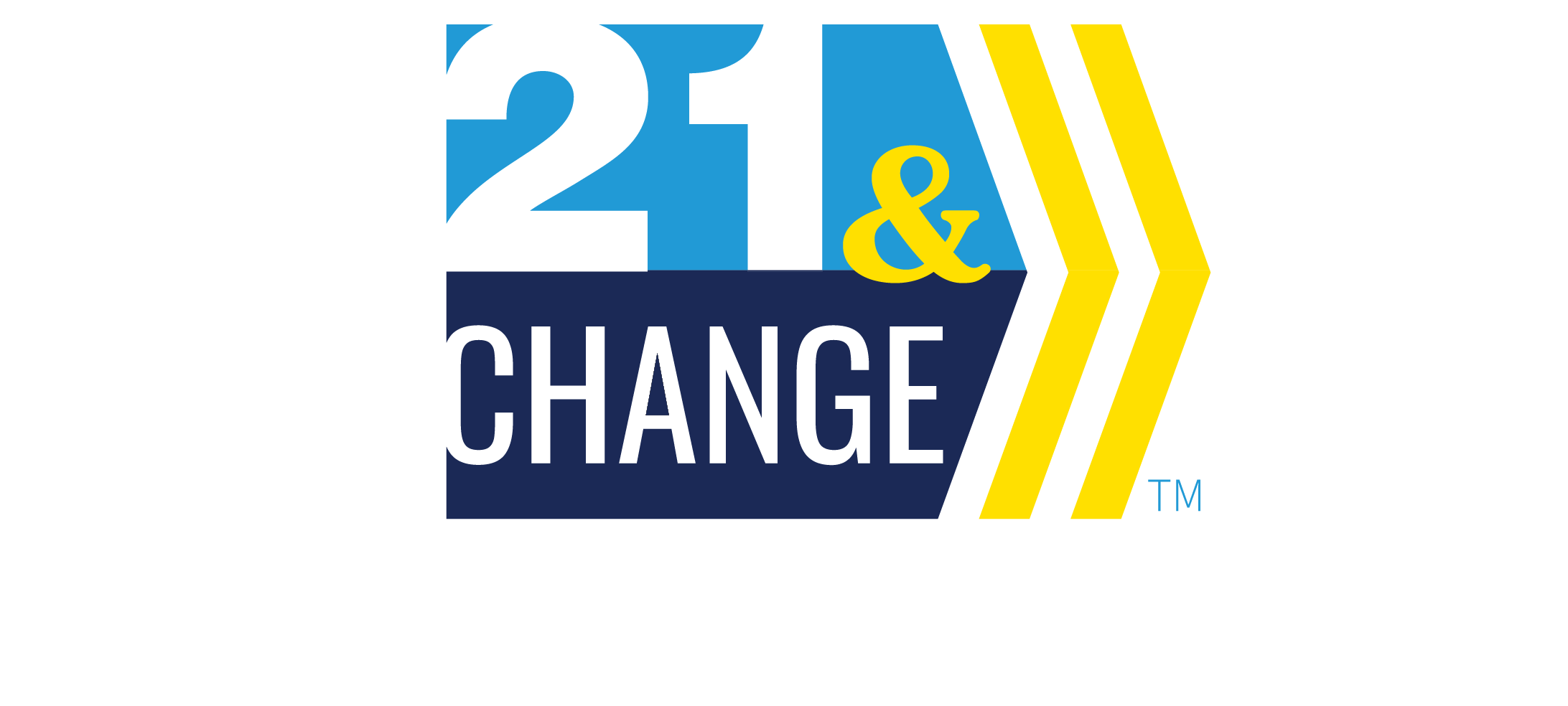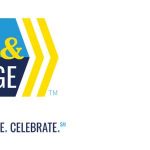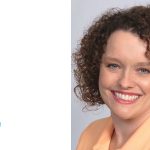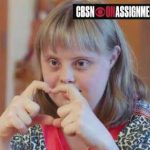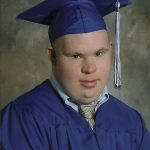Republicans and Democrats Agree: Increase NIH Funding for Down Syndrome Research
A STANDING OVATION, A TESTIMONY THAT WENT VIRAL, AND BIPARTISAN SUPPORT DEFINE A FIRST-EVER CONGRESSIONAL HEARING FOCUSED ON DOWN SYNDROME RESEARCH.
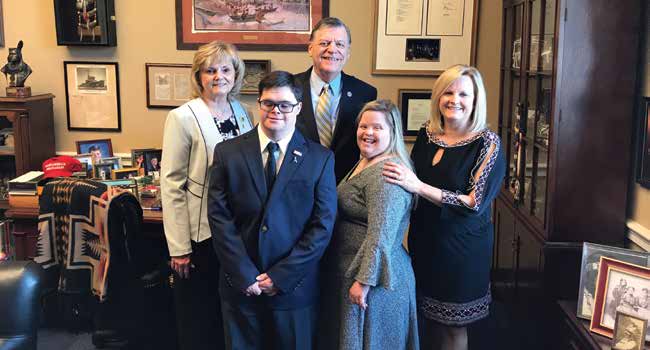
Rep. Tom Cole(R-OK) (Center) with (From Left) Doris and Aaron Erhart and Heather and Lisa Hancock of Oklahoma City
THE GLOBAL DOWN SYNDROME FOUNDATION has been working with the National Institutes of Health (NIH) and members of the U.S. House of Representatives and Senate for nearly a decade advocating for increased federal funding for research benefiting people with Down syndrome.
That work culminated in a first-ever hearing on Down syndrome research before the House Appropriations Subcommittee on Labor, Health and Human Services, Education, and Related Agencies held in October 2017. The subcommittee’s leadership, Chair Rep. Tom Cole (R-OK) and ranking member Rep. Rosa DeLauro (D-CT), organized the momentous hearing, “Down Syndrome: Update on the State of the Science & Potential for Discoveries Across Other Major Diseases,” to explore how Down syndrome research can improve the lives of people with the condition and lead to new treatments for life-altering medical conditions, including Alzheimer’s disease, autoimmune disorders, and cancer. This hearing could spur the kinds of change the Down syndrome community has been waiting for.
FUNDING LEVELS HAVE YET TO RECOVER FROM UNPRECEDENTED 2001 CUTS Despite being the leading cause of developmental delay in the U.S. and the world, Down syndrome is one of the least-funded genetic conditions by the NIH and has been for the last 19 years. The hearing allowed Global to highlight the precipitous decline in Down syndrome research funding at the NIH: from $29 million in 2001 to $14 million in 2006. Unfortunately, despite double-digit growth of the overall NIH budget in the following years, the funding for Down syndrome research never recovered. In 2017, the funding was $27 million, still well below 2001 levels and dramatically smaller compared with the overall NIH budget. Many committee members were surprised by this funding disparity, and several voiced their support for funding increases. Rep. Cathy McMorris Rodgers (R-WA) was a key spokesperson at the hearing and has a 10-year-old son, Cole, who happens to have Down syndrome. She underscored groundbreaking research related to Down syndrome, the immune system, and Alzheimer’s disease.
“Even though Congress has substantially and consistently increased the NIH budget in recent years — in large part thanks to the work of this subcommittee — funding for Down syndrome research makes up less than 100th of a percent of the total budget,” she said.
“The year Cole was born the NIH provided $16 million for Down syndrome research,” she continued. “Today, it’s approximately $27 million. With more than 400,000 Americans living with Down syndrome that’s less than $100 of research per individual [per year].”
Rep. Andy Harris (R-MD), who is also a physician, noted, “We’ve spent 25 times more per person with HIV/AIDS than we do with Down [syndrome]. And remember in 1980, when I graduated from medical school, both had similar reputations. Now why is it [that Down syndrome funding has not increased]? I’ll suggest because we don’t think outside the box, and a lot of federal funding agencies don’t think outside the box.”
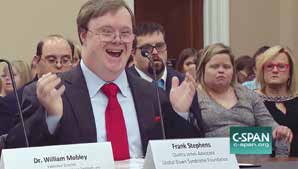
Frank Stephens delivering his testimony, which has been viewed more than 160 million times
‘I’M A MAN WITH DOWN SYNDROME, AND MY LIFE IS WORTH LIVING’ Global’s Quincy Jones Exceptional Advocacy Award winner and eloquent orator, Frank Stephens, lives large and generally out of the box. He gave an impassioned testimony and brought the entire room to its feet.
His opening statement? “I am a man with Down syndrome, and my life is worth living!”
He went on to ask, “Is there really no place for us in the world? Is there really no place for us in the NIH budget?”
“On a deeply personal note, I cannot tell you how much it means to me that my extra chromosome might lead to the answer to Alzheimer’s,” Stephens continued. “It’s likely that this thief will one day steal my memories — my very life — from me. This is very hard for me to say, but it has already begun to steal my mom from me.”
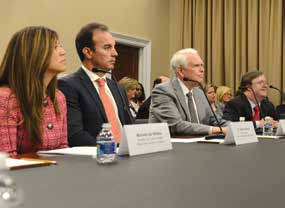
(from left) Michelle Sie Whitten, President and CEO of the Global Down Syndrome Foundation; Joaquín Espinosa, Ph.D., Executive Director of the Linda Crnic Institute for Down Syndrome; William Mobley, M.D., Ph.D., Executive Director of the Down Syndrome Center for Research and Treatment at University of California San Diego School of Medicine; and Quincy Jones Exceptional Advocacy Award winner Frank Stephens
His testimony not only earned a standing ovation from the committee members but also went viral on YouTube via a C-SPAN recording and received more than 160 million views. Rep. Lucille Roybal-Allard (D-CA) said, “Thank you, Mr. Stephens for your very compelling testimony to the subcommittee. All you have accomplished in your life is very impressive. And yes, your life and the life of all those with Down syndrome has value and is truly worth living. As has been highlighted today, individuals with Down syndrome are a gift to society. … Unfortunately, many in our society are too slow to recognize this, and the world has not always been kind to people with Down syndrome.”
Rep. Martha Roby (R-AL) added, “As a mother myself, I am particularly touched by your personal testimony, Mr. Stephens. Every life is precious, and I want you to know that I am with you and I support you. I, too, am deeply troubled by the recent reports out of Iceland and Denmark and other places boasting of ‘being Down syndrome free by 2030.’ … I want you to know that I am unapologetically pro-life, and I will always fight to make sure that your protections for life are under all laws here in United States.”
Rep. Barbara Lee (D-CA) called the hearing “very important and powerful” and shared a personal story about how Annie, her music teacher’s daughter who had Down syndrome, changed her outlook on life.
Rep. Katherine Clark (D-MA) called the hearing “incredible” and thanked Stephens especially for his powerful testimony. Rep. John Moolenaar (R-MI) thanked Stephens and said, “I have to tell you, I think that was one of the best speeches I’ve heard since I’ve been in Congress.”
Rep. Harris echoed those sentiments. “Thank you, Mr. Chairman, for calling this hearing,” he said. “Mr. Stephens, I have been in Congress seven years, and that is the most powerful testimony I have heard at a committee hearing in seven years.”
COMPELLING RESEARCH REQUIRES A TRANS-NIH SOLUTION Stephens’ words were echoed by other witnesses called to testify, including Joaquín Espinosa, Ph.D., Executive Director of the Linda Crnic Institute for Down Syndrome, and William Mobley, M.D., Ph.D., Executive Director of the Down Syndrome Center for Research and Treatment at University of California San Diego School of Medicine. Both researchers agree that Down syndrome research needs a trans-NIH solution.
Dr. Espinosa describes people with Down syndrome as having a different disease spectrum that makes them highly predisposed to some diseases, such as Alzheimer’s disease, leukemia, and autoimmune disorders, while protecting them from other diseases, such as certain heart attacks, stroke, and breast and other solid tumor cancers. His recent landmark discovery, fueled by the Crnic Institute Human Trisome Project™, allows us to recast Down syndrome as an immune system disorder.
“I am convinced that with more specialized research, people with Down syndrome will be able to live longer, better lives,” Dr. Espinosa stated. “Regardless of the historical reasons, the truth remains that Down syndrome research has been underfunded, and clearly it is a multi-organ, multi-site condition that could not possibly fit under the scope of a single NIH Institute.
He continued, “Given the obvious potential of Down syndrome research to advance our understanding of Alzheimer’s, cancer, leukemia, autoimmune conditions, and much more, I think the time is right to think of a trans-NIH initiative to investigate this condition involving many, many institutes at NIH.
When asked about a solution to increasing Down syndrome research funding, Dr. Mobley, an expert on Down syndrome and Alzheimer’s disease, agreed
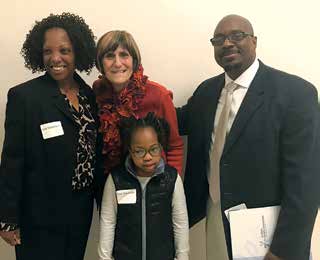
Rep. Rosa DeLauro (D-CT) (center) with (from left) Lisa, Leah, and Stevie Stevenson of New Haven, Connecticut
“I have no perfect formula, but science is so powerful now. … Were NIH to look across the field of Down syndrome research, identify gaps in understanding, [then they could] define priorities to establish the bridge between discovery and therapeutic target, and between target development and clinical trials,” he said. “If they were given the opportunity, encouraged to pay attention to the great science out there, the net result would be more funding. … And so, I agree with this trans-NIH approach. I think it’s exactly right.”
Dr. Mobley continued, “There is absolutely no one in this room who should ever have to suffer from Alzheimer’s disease. I am going to make the case that an investment in research in Down syndrome is going to make it possible for not just those people with Down syndrome but for all the rest of us to avoid it.”
Rep. Pete Sessions (R-TX), a special speaker at the hearing, has a 24-year-old son with Down syndrome, Alex. Alex has many accomplishments, including being an Eagle Scout, a Global Ambassador, and an exceptional athlete. Rep. Sessions thanked the committee and encouraged them to help increase Down syndrome funding at NIH and stressed the creation of a “pot of money” that might be given to NIH Director Francis S. Collins, M.D., Ph.D. “With additional funding, more new and innovative research could take place,” Rep. McMorris Rodgers said. “I urge my colleagues to consider increased NIH funding for Down syndrome research, especially studies that incorporate much needed cross-institute collaboration.”
BIPARTISAN CONGRESSIONAL SUPPORT Throughout the hearing, it was evident that lawmakers were deeply affected and impressed by all the testimonies they heard. Rep. Cheri Bustos (D-IL), one of several guest speakers, mentioned how a young girl with Down syndrome named Brianna touched her heart.
She noted that Brianna has suffered from immune system challenges, and research to help her and others is part of a larger discussion about how to address NIH funding challenges for Down syndrome research, especially in the face of increased funds for NIH overall. “We need to do more to help those with Down syndrome lead longer and healthier lives,” Rep. Bustos said. “We want people with Down syndrome to live well past their 60s.”
Rep. Jaime Herrera Beutler (R-WA) emphasized the need for a two-pronged approach.
“I think you have captured the attention of the panel,” she said. “I think we’re going to do everything we can, but we also need to know how we move this ball forward in society.” Rep. Cole stated in his closing comments, “I’ve had the great privilege to chair this subcommittee for three years, and all of us have participated in lots of committee hearings, but I don’t think any of us have ever been in one quite like this, quite this powerful, and quite this helpful.”
“On a bipartisan basis, we’ve been trying to make [Down syndrome research] a priority in the last couple of years,” Rep. Cole said earlier in the hearing. “The real aim here long-term is to not go through, ever again, a dozen years of flat funding. Now, I’ll point out for the record we did [increase funding] under both administrations. What we need is to shoot toward … a particular process whereby we add to this on a regular basis. It should be like a national investment.”
Ranking member Rep. DeLauro said, “As the witnesses made clear in their written testimony, the potential for scientific breakthroughs related to Down syndrome has never been greater than it is today. …The research presents an opportunity to make scientific advances that will improve the health and quality of life for hundreds of thousands of Americans with Down syndrome and possibly to discover the keys to preventing diseases that affect millions of American families every year.
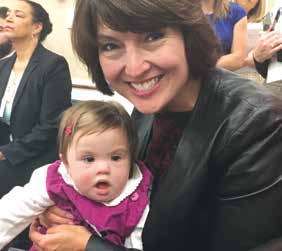 … So with that, our work is cut out for us to increase that funding and find the ways in which to do it for individuals with Down syndrome.” Stephens spoke about how studying people with Down syndrome would benefit his life and that of his mother and others affected by Alzheimer’s disease, solid tumor cancers, and so many other cooccurring diseases and conditions. His closing statement was as compelling as his opening.
… So with that, our work is cut out for us to increase that funding and find the ways in which to do it for individuals with Down syndrome.” Stephens spoke about how studying people with Down syndrome would benefit his life and that of his mother and others affected by Alzheimer’s disease, solid tumor cancers, and so many other cooccurring diseases and conditions. His closing statement was as compelling as his opening.
“Please, think about all those people you love the way I love my mom,” he said. “Help us make this difference, if not for me and my mom, then for you and the ones you love. Fund this research.”
Click here for the full hearing, globaldownsyndrome.org/2017-congressional-hearing-advocacy.
